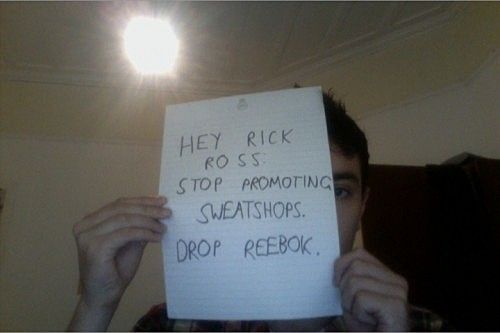Internet Histories | 15 April
This fortnight - the possibilities of Snapchat and film narrative, Rick Ross, Reebok and what happens when people deserve each other, Thatcher, and the C-Mix collated.
This fortnight:
Snapchat | Light Lost
The Narrative Possibilities of Film | The Civilian, in brief
Rick Ross and Reebok | Thatcher and celebrating death
Madeleine Holden's C-Mix collated and other sonics
Rosabel
When Facebook was accused of publishing old private messages last year, it threw into focus the changing way we're using social media. No longer is it simply about interacting with other people. More than anything, it's a tool for shaping the impressions we make, and we're cagier about what we make public because we know that it's permanent. Like conspicuous consumption, it's less about the content than the act. "We are so close," says the amusing picture posted to a friend's wall. "Here is the proof. Please: like it to show everybody how much we understand each other."
That's why I love Snapchat, a new photo and video-messaging application. Unlike other forms of communication, messages sent through this app self-destruct after the recipient has viewed them. You can take screenshots, but if you do, the sender will be notified (creep).
Critics of Snapchat tend to dismiss it as a tool for teen sexting, but at the risk of sounding evangelical, Snapchat is so much more. It represents a return to impermanence in communication. We don't need screeds of banal banter and quick questions recorded for eternity. Most of what we do on social media doesn't deserve to be archived, and Snapchat is a rejection of the unearned importance that other mediums endow our communication with.
It's also a way to retrain yourself to engage. I've developed a terrible habit over these past few years - whenever I receive an email or a text, I'll read it immediately but tell myself I'll reply later, when I have more time, when I can take more care with my response. Sometimes 'later' means a few hours, sometimes it means weeks, and there are days when every message I'm writing begins with an apology. Worse, this line of logic gets applied to messages that don't need time or care - but because the option's there, it's the one you choose.
Messages on Snapchat disappear after you've seen them, so (a) you're less inclined to read them if you don't have time and (b) if the message warrants a reply, you're more likely to do it immediately, before you forget. As Nathan Jurgenson writes:
Snapchat inspires memory because it welcomes the possibility of forgetting. Instead of being shared with a large number of people on a popular website, temporary photographs are taken specifically for and shared with one other person or a small group of people. The meaning of the photo doesn’t rest just in its content but in the choice to restrict its consumption — the choice to send that particular image to that particular person at that particular time, to the exclusion of other images, other recipients, and other times.
The ephemerality sharpens viewers’ focus: Once received, a Snapchat count-down is a kind of time-bomb that demands an urgency of vision, a challenge to exhaust the meaning from the image before the clock runs out. Unlike a paper photo that fades slowly over the years, the temporary photo disappears suddenly. Given only a peek, you look hard.
But mostly I'm looking forward to when Snapchat's servers leak.
This fortnight I also liked Thierry Cohen's Darkened Cities, gorgeous images of stars no longer seen:
He photographs the world’s major cities, seeking out views that resonate for him and noting the precise time, angle, and latitude and longitude of his exposure. As the world rotates around its axis the stars that would have been visible above a particular city move to deserts, plains, and other places free of light pollution. By noting the precise latitude and angle of his cityscape, Cohen is able to track the earth’s rotation to places of atmospheric clarity like the Mojave, the Sahara, and the Atacama Desert. There he sets up his camera to record what is lost to modern urban dwellers.
[caption id="attachment_6345" align="aligncenter" width="500"]
Still from Reprise (2006)[/caption]
The Paris Review recently published the proceedings from the first annual Norwegian-American Literary Festival (don't know what happened there - it's meant to be full-text but the page is blank). Included is a thoughtful interview with Joachim Trier - much of it focuses on how literary conventions can be used in film to widen its narrative possibilities, and he makes a good case for the use of voiceover, a technique I've traditionally cringed at (anything with Morgan Freeman being a notable exception):
Trier
I'll give you an example. You're not supposed to use voice-overs.
It's considered bad form -
Interviewer
Because it's old fashioned?
Trier
Because it moves away from the theatrical tradition. You're
supposed to use action and dialogue to tell your story. But if
you look at the way Terrence Malick uses voice-over, it very
often liberates the images to do something else. The images
are not enslaved, for lack of a better expression, by narrativity
in the classical sense. Thanks to voice-over, the images can be
something other than just plot or story. The film opens up to
something that could be beautiful, tactile, phenomenological,
an observation of the world, a different kind of narrative.
Also included is a conversation between Elif Batuman and John Jeremiah Sullivan. The pair discuss how they find the heart of a story from the masses of material they accumulate, the realities of writing under strict confinements and the need (both practically and ideologically) for fact-checking:
Sullivan
The argument that nonfiction can never be purely nonfiction,
can never get all the way to absolute factual accuracy, is of
course totally solid. We could even have a separate conversation
about whether a "fact" is anything but a social construct at the
end of the day, since "facts" change. But the great nonfiction writers,
or the ones whose work speaks most deeply to me, respond to that
abyss of ambiguity with a determination to be as right as they
can be, and not with a kind of prankish desire to push the ambiguity
in the reader's face, announcing as a discovery something that
everything already concedes. When you do that, you're ripping
the net right out of the tennis match, since nonfiction derives
so much of its power - finds its task, to go back to that - in the
striving towards fact.
*
Finally, for those of you who thought we'd be above an April Fool's Day prank, rest assured: we didn't sell to Groove Guide. Michael Laws is not our new guest columnist. Josh has not become an earnest Whale Oil enthusiast, nor were we quoted on Kiwiblog, much to our parents' disappointment.
Elsewhere, Irish publication TheJournal threatened to become Stuff Nation (presumably without even realising a thing like Stuff Nation existed) and YouTube announced big changes to their site:
Matt
I’m in the middle of moving house and everything’s gone terribly, terribly wrong. In my despair, I’ve watched this video perhaps twelve times.
If you haven’t been keeping up with New Zealand news site The Civilian yet, you ought to. Their story on tiny microphones in John Minto’s house just killed me.
Tonight I’m sleeping on a short cream-coloured carpet rather than the more traditional mattress.
Joe
Sorry.
At the end of last week, shoes and apparel giant Reebok announced they were dropping rapper Rick Ross on the back of a not-very-protracted-but-very-virally-effective public boycott. Ross’s turn on Rocko’s “U.O.E.N.O” (offending lyric: “Put Molly all in her champagne, she ain’t even know it/I took her home and I enjoyed that, she ain't even know it”, Ross’s riposte: “ It was a misunderstanding with a lyric, a misinterpretation where the term rape wasn’t used. I would never use the term rape”, oh okay) triggered the outcry, slotting its date-rape yuks squarely alongside some clanging product placement.
Reebok’s swift consumer response allows them get back in touch with their moral core: making women in El Salvador work 12-hour shifts for 72 cents an hour and denying workers in Indonesia the unpaid wages and severance they’re legally owed. A more glib response could be that Rick Ross and Reebok deserve each other – particularly given that Ross is all nasty bluster only to clumsily disavow ever turning it into action, while Reebok commit nasty deeds and don’t like to talk about them one bit. Sort of a perfect unity, right?
Of course, these moral taxonomies and hierarchies are always fraught. It’s frustrating that elements of the campaign to unseat Ross’s endorsement seemed to be an attempt to appeal to a better nature that wasn’t there, and overshadowed more intensive but less quantitatively successful campaigns to make Reebok substantively change their behaviour. Nine American universities have now cut ties with Adidas/Reebok at management and student level, and while it hasn’t made the same ripples, co-ordinating an institutional cutoff of sponsorship like this takes a lot of guts and hard work. But, to be blunt – rape culture persists in the United States, and a floor for labour laws ensures that the worst sweatshop practices largely don’t. It’s a lot easier to mobilize and galvanize around something you can conceive of.
Having said that, my other thoughts run thus:
- The spectre of alarmed Dave Matthews Band aficionados getting in front of the webcam in their dorm rooms to protest and feeling vindicated in all the ‘problems’ they have with rap is very unappealing, but they’re still allowed to not think date rape is okay. I also think a lot of those cultural boundaries around listening habits are dissolving in a haphazard way and that we’re living through it thinkpiece by thinkpiece, so straw-person moral majority rap panic is more of a depressing rump with a host of complexes of its own.
- Meanwhile, attempts to ringfence rap (attempts to ringfence any cultural movement, basically) always come off as toy-throwing exercises in one-upmanship (rap bloggers whose encyclopedic knowledge of movements and scenes justifies them and them alone to make commentary which will generally amount to “it’s a great song tho”) or worse, Talib Kweli patiently explaining how to be truly conscious to female rap commentators (probably involves wearing more cheesecutters, I don’t really know).
- If the ‘Drop Rick Ross’ thing has achieved something, it was probably this: the next entertainer who gets a lucrative endorsement deal is going to think twice before contributing a lazy-as-fuck rape gag to the sum of human knowledge (and lazy-as-fuck is the other issue here, because underpinning this, or say, Lil Wayne’s latest, is a sense of horror-movie sequel fatigue – the ‘good enough’ of a few shock couplets and similes and no suspense, imagination or atmosphere). It would be great if those who contributed their image and message didn’t reward Reebok in a hurry by buying a new pair of shoes.
My thoughts on Margaret Thatcher’s death oscillated a little. I started with that admonishing and high-minded sense of “well, it’s never okay to celebrate anyone’s death” but then I realized that I wouldn’t have sagely intoned that to people after Stalin, Pol Pot, or Milosevic died. Which is not to say that Thatcher was on the same level, but rather to say that A: people have and are always going to celebrate the deaths of “polarising figures”, B: You wouldn’t begrudge them all the right because you’re so above the fray, C: now you’re just in that impossible game of deciding at what point a death can be commemorated and who can commemorate it. Which I’m not going to do, apart from observing that some people can probably trace the ruination of their and their family’s ways of life to Thatcher’s policies and actions, and some people, er, can’t.
Still, my two favourite bits of writing in the week stepped back from that precipice. I was gobsmacked by Russell Brand’s piece in the Guardian on being a child of the 80s. I’d probably assumed a lot about him, little of it good, without ever reading a word he said. More fool me, because it’s a gorgeous and haunting tone poem with some masterful turns of phrase:
It always struck me as peculiar, too, when the Spice Girls briefly championed Thatcher as an early example of girl power. I don't see that. She is an anomaly; a product of the freak-onomy of her time. Barack Obama, interestingly, said in his statement that she had "broken the glass ceiling for other women". Only in the sense that all the women beneath her were blinded by falling shards. She is an icon of individualism, not of feminism...
What is more troubling is my inability to ascertain where my own selfishness ends and her neo-liberal inculcation begins. All of us that grew up under Thatcher were taught that it is good to be selfish, that other people's pain is not your problem, that pain is in fact a weakness and suffering is deserved and shameful. Perhaps there is resentment because the clemency and respect that are being mawkishly displayed now by some and haughtily demanded of the rest of us at the impending, solemn ceremonial funeral, are values that her government and policies sought to annihilate.
Where Brand’s piece is lighter on analysis or the stats, economist John Cassidy’s column for the New Yorkeris patiently replete with them. If you perceive Thatcher as a wholly motiveless and malign force who infected a green and bucolic halcyon England then you might struggle with parts of it, but it’s quite compelling to have a moderate take you through the measures of GDP, poverty and inequality and understand why Thatcherism failed. Cassidy’s piece is bittersweet for other reasons once you open up the Herald and see what passes for moderate and considered discussion of Margaret Thatcher in there. The inference is clear and depressing – New Zealand’s best-paid and more prominent columnists and editorial writers are appallingly, sickeningly lazy.
Finally, some music. I’m glad that the wonderful young band Grass Cannons have been reconfigured and reconstituted as Trust Punks. Going from one song, their new squall is faster and a bit more apocalyptic, but it covers a lot of ground in two minutes and ticks virtually every box I like my guitar music to tick (Grass Cannons’ sole EP is available for free download here). I’m keen to see them in Wellington this weekend.
Daniel Lopatin’s series of Eccojams under the alias of Chuck Person are such a simple proposition it could be insulting (I have met people who were insulted). Take a snatch of millennial pop culture detritus – 4 seconds of JoJo’s “Too Little, Too Late”, the refrain of Fleetwood Mac’s saccharine ‘Only Over You’ – and skew it, over and over into something transcendently poignant and almost ASMR-inducing. I loved it a lot.
I’ll also accept other people’s spins on it (Supreme Cuts, for example), so I’m enjoying Auckland-based duo Gordon Barnes and Perry Blake’s Cinema Love Songs, Volume 1. Most songs are named after a should-be Criterion classic of the medium – ‘Billy Madison’, ‘Can’t Hardly Wait’, ‘The 40 Year Old Virgin’ – and lovingly tend to classics like ‘The Sound Of Silence’, ‘Freak Like Me’, and Englebert Humperdinck’s ‘A Man Without Love’. Their own analogue interruptions do a handy job of distinguishing their take.
Finally, a big thanks to ‘Rhelara’ who sent us through a 8 Tracks version of Madleine Holden’s C-Mix from her fantastic piece, ‘Eat Up And Lay With It’. Finally, you can relive the highs and lows of trying to get every cunnilingus song corralled in the same place yourself.
The C-Mix from rhelara on 8tracks Radio.






